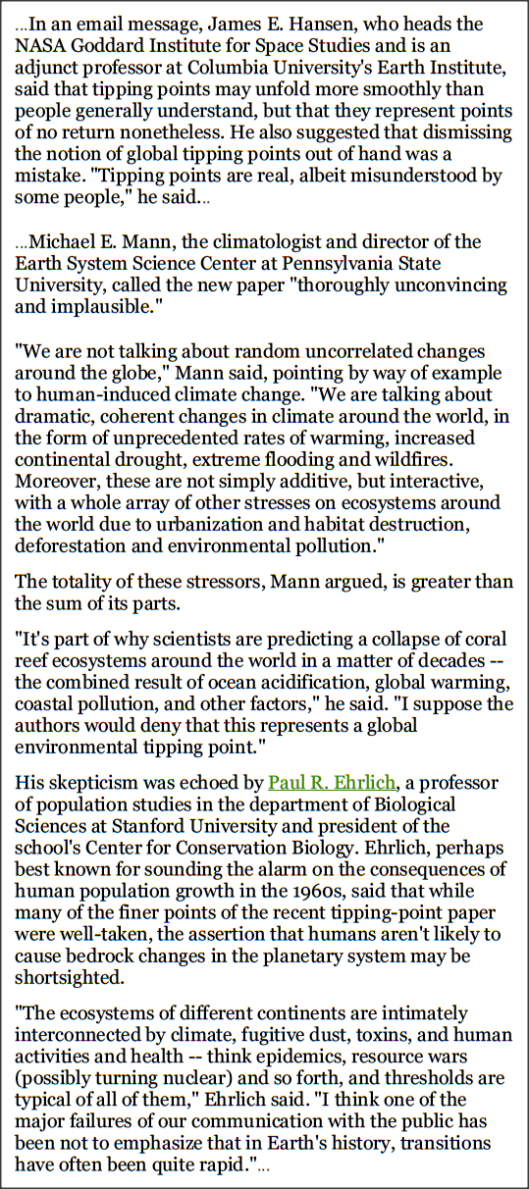via: MicrosoftTranslator.com
04
Monday
Mar 2013
Tags
Addiction to Fossil Fuels, Barry W. Brook, Climate Change, Climate Tipping Points, Collapse of Industrial Civilization, Does the terrestrial biosphere have planetary tipping points?, Ecological Overshoot, Environmental Collapse, Extinction of Man, James Hansen, Mass Die Off, Michael E. Mann, Paul R. Ehrlich
Addiction to Fossil Fuels, Barry W. Brook, Climate Change, Climate Tipping Points, Collapse of Industrial Civilization, Does the terrestrial biosphere have planetary tipping points?, Ecological Overshoot, Environmental Collapse, Extinction of Man, James Hansen, Mass Die Off, Michael E. Mann, Paul R. Ehrlich
I would like to believe that planetary tipping points do not exist
and that the activities of 9 billion humans cannot “break the planet”,
rendering it uninhabitable for future generations, but on just an
intuitive level I feel this is wishful thinking. So it was with some
surprise that I saw the following article:
A group of international ecological scientists led by the University of Adelaide have rejected a doomsday-like scenario of sudden, irreversible change to the Earth’s ecology.I would have to disagree that ecosystems on different continents are not connected. The health of one ecosystem affects other ecosystems globally. For example, the loss of the Arctic and its albedo effect has global repercussions for climate patterns such as is discussed here:
In a paper in the journal Trends in Ecology and Evolution, the scientists from Australia, US and UK argue that global-scale ecological tipping points are unlikely and that ecological change over large areas seem to follow a more gradual, smooth pattern…
…A tipping point occurs when an ecosystem attribute such as species abundance or carbon sequestration responds rapidly and possibly irreversibly to a human pressure like land-use change or climate change.
Many local and regional-level ecosystems, such as lakes and grasslands, are known to behave this way. A planetary tipping point, the authors suggest, could theoretically occur if ecosystems across Earth respond in similar ways to the same human pressures, or if there are strong connections between continents that allow for rapid diffusion of impacts across the planet.
“These criteria, however, are very unlikely to be met in the real world,” says Professor Brook. “First, ecosystems on different continents are not strongly connected. Second, the responses of ecosystems to human pressures like climate change or land-use change depend on local circumstances and will therefore differ between localities.”
The scientists examined four principal drivers of terrestrial ecosystem change ? climate change, land-use change, habitat fragmentation and biodiversity loss ? and found they were unlikely to induce global tipping points.
Co-author Associate Professor Erle Ellis, University of Maryland, Baltimore County, says: “As much as four fifths of the biosphere is today characterised by ecosystems that locally, over centuries and millennia, have undergone human-driven regime shifts of one or more kinds. Recognising this reality and seeking appropriate conservation efforts at local and regional levels might be a more fruitful way forward for ecology and global change science.

…A difference in temperatures between the Arctic and areas to the south is usually the main driver of the wave flows, which typically stretch 2,500 and 4,000 km (1,550-2,500 miles) from crest to crest.In a recent article by Tom Zeller Jr. entitled ‘Tipping Points: Can Humanity Break The Planet?‘, we get to hear what a couple of noted scientists think about this new paper downplaying planetary tipping points:
But a build-up of greenhouse gases in the atmosphere, blamed on human activities led by use of fossil fuels, is heating the Arctic faster than other regions and slowing the mechanism that drives the waves, the study suggested…

Wrecking the Earth Planetary Tipping Points Refuted
Being a human, I care not whether planet Earth will survive humanity, but whether we humans will survive the environmental onslaught of our own activities. Of course the Earth will continue on without us, but that’s an empty consolation for the human species whose time in history will soon be forgotten on a planet left uninhabitable for our children. So do planetary tipping points exist or can humans do whatever they like with no real world effect to the global biosphere? I guess we’ll soon find out. Keep in mind that there is no precedent in the past 2.5 million years for the kind of rapid, human-induced global warming the Earth has been undergoing since the onset of the industrial revolution. We are in uncharted territory.
via: MicrosoftTranslator.com http://www.microsofttranslator.com/bv.aspx?from=en&to=de&a=http://collapseofindustrialcivilization.com/2013/03/04/wrecking-the-earth-planetary-tipping-points-refuted/
http://www.youtube.com/watch?v=ljLOm4KTYN8&feature=share&list=PLtGsHYiFHfJxEdNk5rKRmTO5_8Pfq14Wx&index=20


Keine Kommentare:
Kommentar veröffentlichen